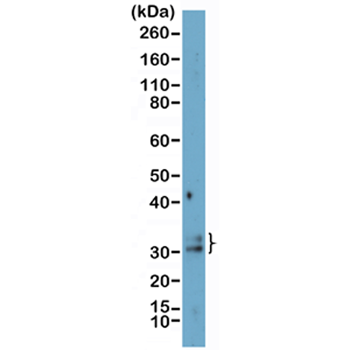anti-DDIT3 (DNA Damage-inducible Transcript 3 Protein) Rabbit Monoclonal (RM485)
Product Code:
REV-31-1377-00
REV-31-1377-00
Host Type:
Rabbit
Rabbit
Antibody Isotype:
Rabbit IgG
Rabbit IgG
Antibody Clonality:
Recombinant Antibody
Recombinant Antibody
Antibody Clone:
RM485
RM485
Regulatory Status:
RUO
RUO
Target Species:
Human
Human
Application:
Western Blot (WB)
Western Blot (WB)
Shipping:
BLUE ICE
BLUE ICE
Storage:
-20°C
-20°C
No additional charges, what you see is what you pay! *
| Code | Size | Price |
|---|
| REV-31-1377-00-R100 | 100 ul | £455.00 |
Quantity:
Prices exclude any Taxes / VAT



